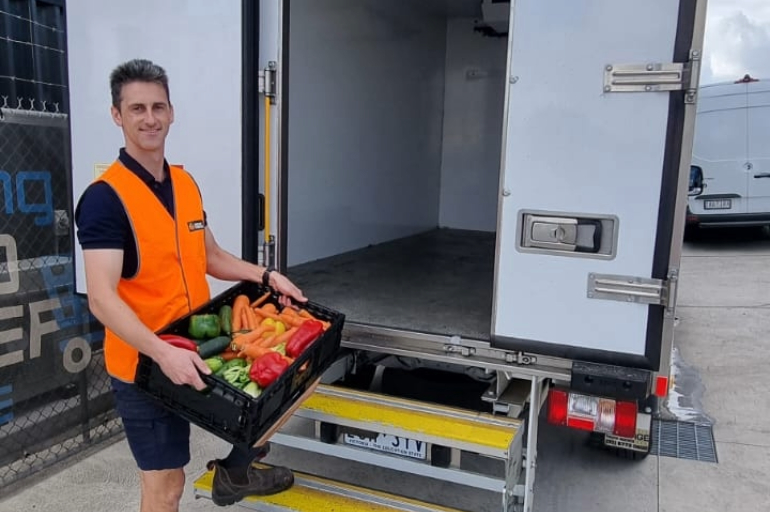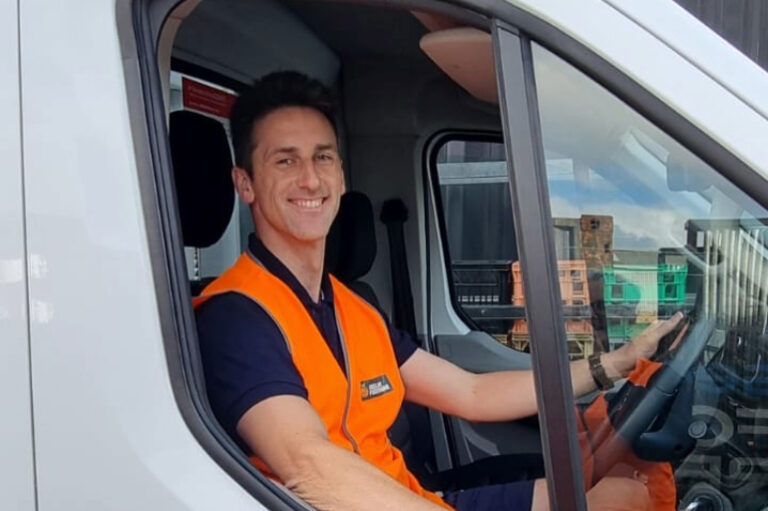Geelong Foodshare, a not-for-profit charity focused on food rescue and distribution, kicked off its fleet electrification journey recently, acquiring a used LDV eDeliver 9 electric van at auction.
The ex-Coles van was purchased through Pickles Auctions for around a fifth of the price of a comparative new model, explains Geelong Foodshare’s Operations Manager, Patrick Lanyon.
“I saw it come up at the auctions with a body fitted that was perfect for our operation, but we only had about 48 hours to make a decision,” he said.
“Thankfully I’d already done the ground work with our CEO across the last two years, as well as trialling some EVs, and we had the plan to electrify our fleet – so we could move quickly. We expected to pay three to five times this much to buy a used EV and have a body fitted!”
The vehicle was in near-new condition with just 20,000km on the clock, and Patrick tells us it was even cheaper than buying an equivalent diesel.
“There is usually a higher upfront cost for these electric vehicles, but the second-hand market offers massive opportunities for smaller fleets and excellent value for money even if you compare them to diesels,” he said.
As larger companies conclude EV trials, Patrick believes opportunities are arising within the second-hand market that benefit small and not-for-profit operations like Geelong Foodshare.
“There’s the obvious value for money, but it’s also peace-of-mind with fewer moving parts than a traditional diesel vehicle,” he said.
“As more of them enter the used market during these early stages, the opportunities just get better. Then in say, five years, when it comes time to sell them, the pressure on fleets to reduce emissions could make for a pretty strong used market.”
Geelong Foodshare’s current fleet includes a mix of Mercedes Sprinters, Renault Masters, and Fuso Canters, but Patrick has plans to electrify more of the fleet with options like the LDV eDeliver 9.
The transition makes sense for Geelong Foodshare, with their vehicles travelling a low 100-150km each day as they collect surplus food from supermarkets and deliver it to charities.
Geelong Foodshare also utilises solar power to charge the new EV with a three-phase wall charger, which Patrick estimates will save them around $4,000 per year in fuel costs. As he explains, it’s the operating costs that present the greatest challenge for not-for-profit organisations, making EVs an obvious choice.
“It’s much easier to find money for a tangible capital cost, given we rely on donors, but it’s very, very hard to find money for operating costs,” he said.
“So this is a clear winner, because you’ve got a fancy new vehicle people want to get in, it produces zero tailpipe emissions, and it reduces our operating costs.”

Driving the used EV market are auction houses like Pickles, who are experiencing increased demand for commercial vehicles as they enter the second-hand market.
“We’re seeing strong interest from customers looking to diversify their fleets with EV trucks, often as part of their ESG reporting and carbon reduction goals,” said Pickles General Manager of Automotive Solutions, Brendon Green.
“While some remain cautious – raising concerns about servicing, charging infrastructure, range anxiety, and depreciation – recent listings of electric trucks have each received over 2,000 views on our website, highlighting the growing demand for these assets.”
Brendan points out that many of the larger companies trialling electric trucks and vans are starting to replace them with newer models, offering enticing used deals for fleets looking to reduce their emissions.
“The low-kilometre used EVs coming off trials represent excellent value for both large and small fleets wanting to adopt electric vehicles,” he said.
“Beyond the lower running and maintenance costs, these vehicles help project an environmentally responsible image and position businesses as innovative.”
Up until now the biggest concern surrounding used EVs was battery health, but Brendan points out that testing programs are in place to offer peace of mind and Pickles plans to expand these services to commercial vehicles.
“Under the Pickles Battery Assurance Program, we’ve tested more than 400 electric vehicles to assess battery health,” he said.
“The average score across all vehicles tested is currently 96.3 percent, with an average age of 2.5 years and 29,000km. At this stage, testing is limited to passenger vehicles, but we’re working closely with our European partners to extend capabilities to commercial EVs as volumes increase. Soon, battery scores for motor vehicles will be shared with buyers prior to bidding – an important step in building buyer confidence, especially among trade buyers.”
For Patrick and the team at Geelong Foodshare, the used EV options entering the market present an opportunity to accelerate decarbonisation plans as they continue to give back to the community.






